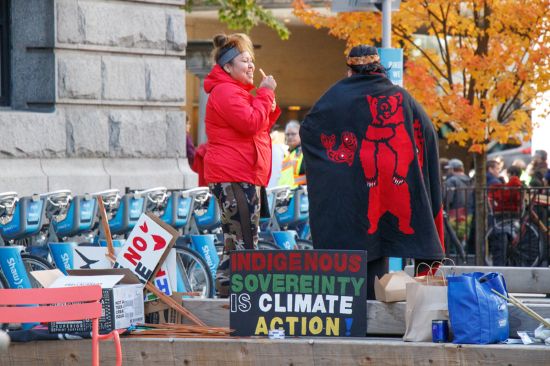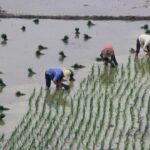Last October, in Geneva, Switzerland, Indigenous leaders from around the world agreed unanimously on what would constitute a just transition that would impact their way of life. Nearly 100 gathered to promote what they believe are their roles and responsibilities in achieving a clean green sustainable future for all humanity.
The published document from the conference was entitled Indigenous Peoples Principles and Protocols for Just Transition. It declares several principles for state actors to agree to follow for future projects that impact Indigenous ancestral lands.
The Indigenous people of the planet have always described their relationship with the land, ice, water and traditional territories as sacred. They see themselves as the stewards of the planet and its defenders. Their traditional way of life before the coming of colonial settlements in the Americas, and colonial conquests elsewhere is seen as being in harmony with nature. They see correcting the historical wrongs, and intrusive, harmful and sometimes violent actions by countries and non-Indigenous groups as violations of this sacred trust.
At Geneva, the Indigenous leaders described the principles they deem essential to their and the planet’s future. These include:
- The Right to Life guarantees Indigenous people’s present and future existence.
- The Right to Self-determination to recognize the sovereignty and inherent rights of Indigenous people under standards in the United Nations Declaration on the Rights of Indigenous Peoples (UNDRIP) including their right to freely determine their own political, social, economic development and future, and rights to equitable benefit-sharing.
- Decolonization to reject the colonial exploitation of Indigenous lands.
- Reparations and Land Restoration to ensure unrestricted access, restoration, recognition, and respect of Indigenous people’s rights to their ancestral lands, water, territories, and resources that have been taken without consent. This includes guarantees of economic and non-economic reparations for historical and continuing damage.
- Respect for the Indigenous Way of Life to guarantee food sovereignty and lived experiences as well as respect for Indigenous economies, science, technologies, innovations, jurisdiction, languages, cultures, spirituality, beliefs and ancestral practices.
- Transparency and Accountability for all projects with the opportunity for active and effective negotiations that recognize the requirement for informed consent from design to implementation, monitoring, and evaluation, affecting Indigenous lands and water, territories and resources.
- Eliminating Human Rights Violations of Indigenous Peoples as environmental defenders and cultural practitioners, including ending extrajudicial killings, torture, imprisonments, surveillance, and other threats, intimidation, and reprisals in response to the Indigenous right of patrimony regarding protecting the land and environment.
- Recognizing Indigenous Roles and Responsibilities as caretakers, stewards and guardians of traditional lands, forests, deserts, savannas, lakes, rivers, air and ice. – Recognizing Indigenous Peoples’ roles “as caretakers of the plants and animals of the planet and stewards, and guardians of traditional lands, rangelands, forests, deserts, savannas, water, air, ice, and resources.
- Limiting global warming to no more than 1.5 Celsius degrees with direct access to financing Indigenous Peoples’ projects addressing climate change mitigation, adaptation, and resilience with direct access to funds to cover loss and damages.
- A Rights-based Approach to Supply Chains to ensure they do not cause harm to Indigenous Peoples, other peoples, ecosystems, or sacred sites including the assessment of the totality of supply chains from raw materials to end-use projects to waste.
To ensure these principles are followed the attendees of the conference committed themselves to consider “utilizing international human rights bodies and national, international and regional mechanisms to submit urgent complaints to stop states’ actions and rights’ violations” and refusing to tolerate any forced evictions, displacements, relocations, dispossession, and expulsion, in the name of “green transition” projects.”
Defining the current and future role of Indigenous People was a widely discussed subject at COP29. In a just and sustainable green transition, it was recognized that the world could no longer marginalize the voices of the Indigenous whether in the Amazon or the Arctic. The conference attendees professed there can be no green transition without their full participation stating that the role of the Indigenous People has always been about protecting the Earth and that it is their responsibility and their right. Without Indigenous voices, the conference noted that “even the greenest economy will run dry.”









